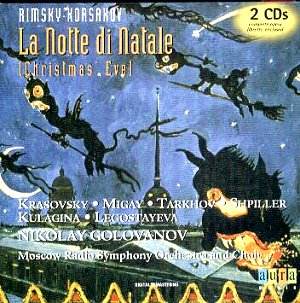Composed immediately before Sadko, Christmas Eve (Noch’
pered Rozhdestvom) was based on the Gogol story that Tchaikovsky
had used for Vakula the Smith (Cherevichki). For all the charm
and brimstone, for all the lush orchestration and the stentorian devilish
rants, Christmas Eve succeeds mainly in demonstrating the relative limitations
implicit in the musico-scenic fantasies by which Rimsky was so greatly
taken. Following May Night, Snow Maiden and Mlada
Rimsky thought to complete the "Solar Cycle" with Christmas
Eve but its composition in 1894-95 overlapped with the beginnings
of interest in Sadko, a project that seemingly absorbed him far
more. Indeed the St Petersburg première of Christmas Eve was
boycotted by Rimsky, furious that the royal family had insisted on foisting
changes on it. Its reputation has scarcely recovered but if anyone was
going to breathe life into it Golovanov was the man. Recorded in 1947
with a strong cast this Lyrica double (from the Aura stable) comes with
a number of limitations for Anglophone, indeed non-Italian speakers
– there are no notes whatsoever and the booklet consists merely of an
Italian libretto. It’s as well to detail these potential bars to enjoyment
at the outset.
In the Introduction we are introduced to Rimsky’s delightful
amalgam of lush orchestration, and an antiquarianism jostling with Wagnerianisms
to particularly glistening effect (via those Russian horns). The sound
is splintery post War and boxy, quite raw and one dimensional without
spatial depth - but you won’t find it oppressive. The introduction is
full of incipient fantasy (horns joined by harp, setting up intimations
of Rusalka – Rimsky of course had dealt with the myth earlier
in May Night) and some nestling percussion and burnished strings
cultivated by Golovanov’s energetic, bristling baton. Of the singers
Kulagina is strong if strident, Pontryagin has a prominent tenorial
vibrato – though these seem not inappropriate given the slashing viola
support and blazing Scheherazade orchestration of their opening
scene in which Natalya Kulagina’s Solokha meets Pontryagin’s Devil.
Both basses are sonorous in the authentic Russian tradition and play
off each other well but Dmitri Tarkhov as Vakula opens somewhat weakly
with an indistinct head voice and a bleat lower down. But he develops
a lyric ardour later on with real Slavic bite and proves himself an
increasingly credible presence in an opera not bristling with much dramatic
tension and life; in fact it’s more of a tableau with minimal characterisation
and little motivic development, living instead through delightful morceaux
and a sense of the unreal for its vivacious life.
I enjoyed bass Sergei Krasovsky’s bleak black parlando
in his meeting with Tarkhov as I did the following piquancies of the
writing for flute and the elfin impress of the Second Scene in the First
Act (Rimsky seemingly taking delight in juxtapositions of tension and
orchestration). Whether you will swoon at the sound of the venerable
Natalya Shpiller rather depends on your tolerance level for Slavic Soprano
Wobble – but she’s certainly got plenty of range and dramatic projection.
As befits a work of this kind, where anvil and balladry are never far
away, Vakula’s song in the Second Scene is full of delightful folk inflexions
and the chattering and vigorous skittering of the Young Maidens who
end the Act is conveyed with no little vigour under the sweeping arm
of that maestro of monumentality, Nikolai Golovanov.
There are of course many other incidental – if uneven
– pleasures; Sergei Migay throws in a good act as the pompous Mayor
and the breathless clerk is tenor Sergei Streltsov, full of nasal insinuation
in his unaccompanied solo, a good touch. As the Fourth Scene of the
Second Act draws to a close we can hear again those Wagnerian motifs
and the driving, marching stridency and powerful direction that Golovanov
generates (in truth I sense he’s at his happiest in those moments of
orchestral reprieve where he can whip up band and choir into a dramatic
curve). As a pretty much static work – dramatically speaking – we get
more of the same; raw chilling trumpets, chattering wind, shrill choirs,
dance rhythms and folk inflexion. There’s a splendid role for the orchestral
leader in Act III and some blazing ferocity as the Act draws to a conclusion
– especially when the Devils get to work and when the Polonaise Chorus
begins to swirl. As the Tzarina, mezzo Ludmilla Legostayeva is introduced
with a novelty that hearkens back to the very opening orchestral introduction
– as befits her dignity and status Rimsky has her use a very old fashioned
and incongruous sounding operatic recitative. Her antique and timeless
measure thus established – and with the da capo work for choir as well
– and added to them the dark, rich tones of the Cossack chorus the work
threatens to come apart at the stylistic seams. Perhaps it does – who
cares when the Cossacks are having such stentorian fun. Elsewhere I
admired the extended scena for the soaring soprano Shpiller and the
orchestral leader, a virtuosic and attractive bit of scene painting
and the fine, incisive occasionally overwhelming contributions of chorus
and, not least, conductor.
With the limitations as noted, both in documentation
and recording – and also in terms of the work itself – this is so far
as I’m aware the only recording currently available (and I can’t vouch
that it’s in any way complete). I wasn’t converted to Rimsky’s musico-scenic
adventure but I enjoyed the sulphur and the rose petal along the way.
Jonathan Woolf
